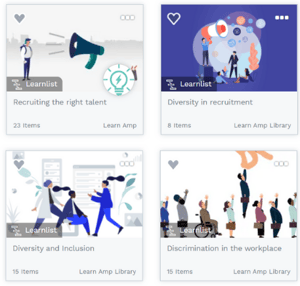Everyone likes to assume they’re a rational and objective person, but just by nature of being human we're all affected by something known as ‘unconscious bias’.
As the name suggests, unconscious bias is related to views that we form about individuals or groups outside of our own conscious awareness. These views are typically developed thanks to our background and experiences in life and can manifest when we discriminate against – or even favour – certain groups without realising it.
Much of the discussion around unconscious bias is misunderstood, demonstrated recently after a group of MP’s said they would decline unconscious bias training. Ben Bradley, MP for Mansfield, said “we should reject the premise that we’re all unconsciously racist” while several of his colleagues tweeted in agreement.
Well said Ben. I've had to sign up to the "Valuing Everyone" re-education course as not signing up is apparently a clear marker that I don't value people and require third-party intervention.
— David Warburton MP (@DJWarburton) September 20, 2020
This is insane and, like @BBradley_Mans, I'll also go no further down this rabbit hole. https://t.co/DAaWZjeUoN
This misconception around unconscious bias is quite common according to Shagufta Sharif, Development Manager at WISE[1], an organisation which offers support services to STEM organisations looking to improve their gender balance.
“Unconscious bias has got a really bad reputation and many people have an old-fashioned view of what it truly is,” says Sharif.
“People seem to think that unconscious bias training is spending a few hours in a room with someone telling them how terrible they are, but that’s not the case at all.”
Unconscious bias training is instead informing you that these biases do exist while equipping you with the tools to recognise and deal with it in the workplace.
People also have an outdated view of how these biases can manifest says Sharif: “People think that when someone is being racist, it’s them using the kinds of words that they would never use, but things like racism and sexism and other prejudices have all mutated now.”
It’s not as simple as you might think to know when people are being discriminated against, but companies can, and should, do the work to root these prejudices out of their organisations.
How can you address unconscious bias in your organisation?
The first step is to acknowledge that there is work to be done. The second step is to commit to putting in the time and effort needed to truly combat unconscious bias in the workplace.
It’s important to acknowledge from the beginning that unconscious bias isn’t something that will be eradicated with one training session, there needs to be a genuine strategy put in place. For those serious about making a difference in their organisation, Sharif recommends “treating it like any other business improvement project.” This involves setting tangible targets and creating a plan of action to decide how those targets are going to be achieved.
This could involve using your employee platform to send out a survey to understand how your employees perceive the organisation. What are their daily experiences? Do they feel like the organisation is inclusive enough? Do they feel like more could be done?
Once you’ve collected and collated this information you can then go through it and see what you’re missing from the employees’ point of view and begin to work out a strategy from there. It’s important, says Sharif, to include all departments in this survey, and you may be surprised by the results you receive.
“Often we’ll have HR departments rating their diversity and inclusion initiatives quite highly, but then you’ll receive the feedback from someone working on a remote site who might reveal they’ve actually experienced quite a lot of discrimination on a day-to-day basis.
“It’s really eye-opening to find out how different people within the organisation feel. The important thing here is that these organisations are open to being scrutinised like this. If they do want to actually make a difference, then they have to understand that these things do go on and they need to tackle them.”
So how do we tackle them while working remotely?
As companies across the country once again make the shift to working from home, it’s important not to let your unconscious bias training fall by the wayside. “Just because you can’t meet face-to-face it doesn’t mean you can’t do anything on diversity and inclusion,” says Sharif. “Technology is advanced enough that working remotely isn’t a valid enough excuse not to do anything. I think the need to do everything remotely has now made it even more powerful.”
 Use your employee learning platform to provide a Learnlist of unconscious bias training relevant to the issues that came out of your companywide survey.
Use your employee learning platform to provide a Learnlist of unconscious bias training relevant to the issues that came out of your companywide survey.
Start with something to open the mind, then choose content that will deliver insight and knowledge in an engaging manner.
Webinars and video conferences are also a great way of utilising technology while working remotely to ensure you remain on track with your unconscious bias targets. It’s important to make sure these sessions are inclusive too. Do they come with subtitles? Has a transcript been made available? Are they available for download for employees who could not make the conference live?
Create a culture where people feel comfortable speaking out
This, of course, all hinges on you creating a culture where people feel comfortable speaking out about their experiences in the workplace. If you haven’t cultivated a safe and welcoming space for your employees, then the results of your surveys and the training you put forward will be meaningless.
The key to creating this kind of space is role modelling from the top says Sharif. “The people at the top of organisations are people in power, so if they refuse unconscious bias training then what kind of message does that give to everyone else?”
Let your employees know that you’re serious about inclusion, understanding why problems may arise, and finding solutions by being open and honest. “As an organisation becomes more inclusive and open, the more people are willing to talk about themselves and be more open,” says Sharif.
To find out how Learn Amp can help you create a more inclusive workplace, book a demo below.
References
[1] https://www.wisecampaign.org.uk/





